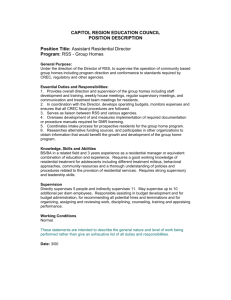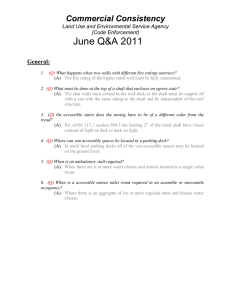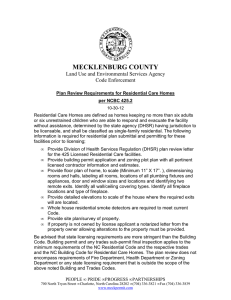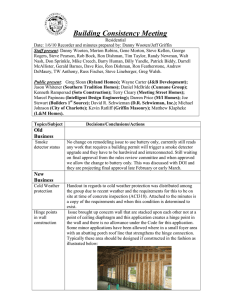Building Consistency Meeting
advertisement
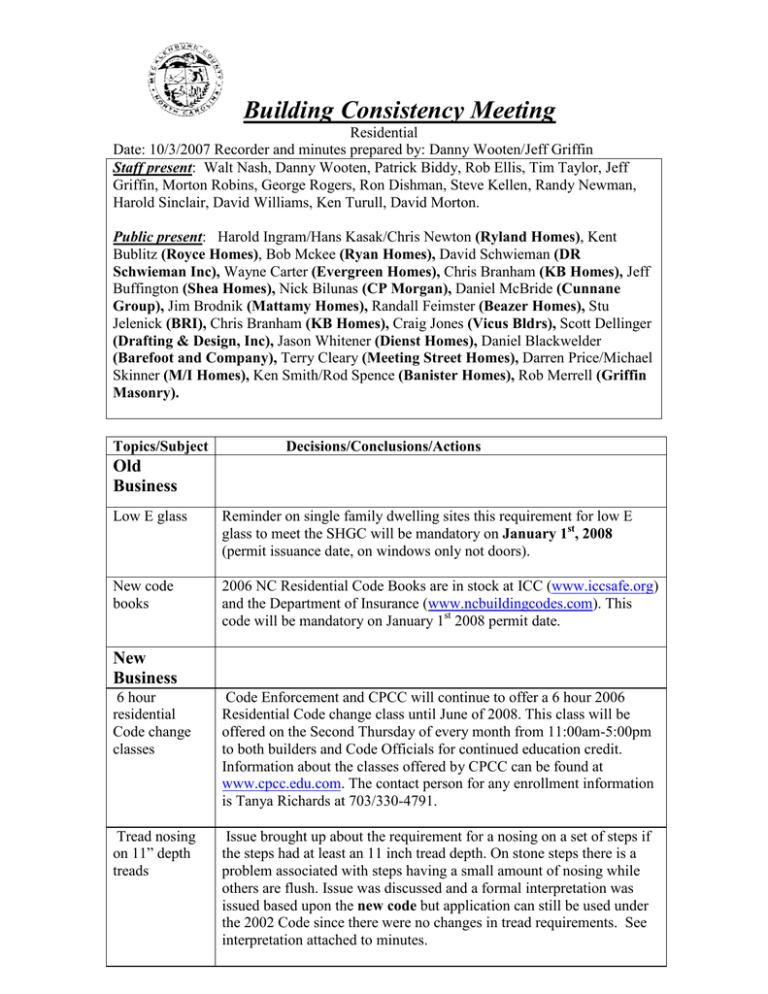
Building Consistency Meeting Residential Date: 10/3/2007 Recorder and minutes prepared by: Danny Wooten/Jeff Griffin Staff present: Walt Nash, Danny Wooten, Patrick Biddy, Rob Ellis, Tim Taylor, Jeff Griffin, Morton Robins, George Rogers, Ron Dishman, Steve Kellen, Randy Newman, Harold Sinclair, David Williams, Ken Turull, David Morton. Public present: Harold Ingram/Hans Kasak/Chris Newton (Ryland Homes), Kent Bublitz (Royce Homes), Bob Mckee (Ryan Homes), David Schwieman (DR Schwieman Inc), Wayne Carter (Evergreen Homes), Chris Branham (KB Homes), Jeff Buffington (Shea Homes), Nick Bilunas (CP Morgan), Daniel McBride (Cunnane Group), Jim Brodnik (Mattamy Homes), Randall Feimster (Beazer Homes), Stu Jelenick (BRI), Chris Branham (KB Homes), Craig Jones (Vicus Bldrs), Scott Dellinger (Drafting & Design, Inc), Jason Whitener (Dienst Homes), Daniel Blackwelder (Barefoot and Company), Terry Cleary (Meeting Street Homes), Darren Price/Michael Skinner (M/I Homes), Ken Smith/Rod Spence (Banister Homes), Rob Merrell (Griffin Masonry). Topics/Subject Decisions/Conclusions/Actions Old Business Low E glass Reminder on single family dwelling sites this requirement for low E glass to meet the SHGC will be mandatory on January 1st, 2008 (permit issuance date, on windows only not doors). New code books 2006 NC Residential Code Books are in stock at ICC (www.iccsafe.org) and the Department of Insurance (www.ncbuildingcodes.com). This code will be mandatory on January 1st 2008 permit date. New Business 6 hour residential Code change classes Code Enforcement and CPCC will continue to offer a 6 hour 2006 Residential Code change class until June of 2008. This class will be offered on the Second Thursday of every month from 11:00am-5:00pm to both builders and Code Officials for continued education credit. Information about the classes offered by CPCC can be found at www.cpcc.edu.com. The contact person for any enrollment information is Tanya Richards at 703/330-4791. Tread nosing on 11” depth treads Issue brought up about the requirement for a nosing on a set of steps if the steps had at least an 11 inch tread depth. On stone steps there is a problem associated with steps having a small amount of nosing while others are flush. Issue was discussed and a formal interpretation was issued based upon the new code but application can still be used under the 2002 Code since there were no changes in tread requirements. See interpretation attached to minutes. Anchor bolt requirement change for townhouses There is a new requirement for interior bearing walls on townhouses to be anchored with standard ½” anchor bolt in Seismic design category C which is our area. This requirement also has a much larger washer specified in R602.11.1, this washer size is required on all bolts, exterior or interior. Anchor straps used on townhouse will have to be by engineering design based upon equivalent holding capacity. R403.1.6.1 Additional townhouse anchorage 2x4 exterior handrails Plan review Retaining wall changes Weep hole requirements Issue brought up about the exception that was allowed under the 2002 Residential Code, section R315.2, which is no longer in the 2006 Code. This will prevent builders from using 2x4 railings on porches and decks and a graspable type 1 or type 2 handrail as listed in the 2006 code will need to be provided on structures permitted after January 1st, 2006. The BCC is currently trying to getting an amendment approved to allow at specific exterior locations the use of a 2x4 rail but currently has not passed. The Department is still moving toward plan review on all residential new structures and will look at doing so once staff is in place to handle loads in a timely manner. Currently projecting no earlier than March of ’08 but may be later. There are several significant changes dealing with retaining walls (see section R404.1.3, page 59 of the 2006 Code). Based upon new language in the Code retaining walls that cross property lines and those that have more than 48” of backfill against them anywhere on a residential lot will be required to have an engineering design and permit. This retaining wall can be pulled with the house and needs to be noted on the application that retaining wall is included in construction cost or a separate permit for retaining wall only can be pulled. The question that came up during the meeting was how the Department will inspect these retaining walls. The only wall that will need to be called in and checked by an inspector will be the poured concrete foundation walls. Other retaining wall systems like keystone blocks will need to be reviewed by an engineer and a final sign off letter provided to the Code official and final stating that the wall was installed per provided engineering plans. So at final both the plans and sign off letter will be needed on everything but poured in place concrete wall system. Question asked about weep hole requirements and are they needed over window and door openings regardless of opening width. Per NCDOI all flashing lines will have to have at least 1 weep hole, example being if you have a 2/0 window you must have 1 weep hole, best location is centered on the opening. Code references are R703.7.5 and R703.7.6. Errata sheets Errata sheets are corrections to printing errors found in the 1st printing for NC 2006 edition of the 2006 NC Residential Code Book. These errata sheets are residential code now found on line at www.buildingcodes.com. A specific NC 2006 & Commentary Residential Code commentary book is now available from the ICC bookstore for immediate shipment. CODE INTERPRETATION CODE: SUBJECT: MECKLENBURG COUNTY Building Code Enforcement 2006 NC Residential Code Tread nosing requirements Reviewed by: 101, 139 & 147 Questions: 1. If a flight of stairs has a uniformed tread depth of 11” is a nosing required? 2. If a nosing is provided on an 11” tread depth stair are they required to be uniformed? Code reference: R311.5.3.3 ANSWER: No to both questions. Exception #1 under R311.5.3.3 states that a nosing is not required if an 11 inch tread depth is met. If in a flight of stairs there is a uniformed 11 inch depth measured at the treads leading edges then no uniformed nosing is required. In this case, as pictured below, treads could have a variety of nosing and no nosing application as found on some stone steps as long as uniformity of the tread was maintained and depth was enough to meet the requirements of exception #1. The structural support capacity of any such nosing projection must be taken into account. 11” Approved By ___Gene Morton_____________ F:\CORE\CORESUP\KATHY\GENE\CDEINTRP\wythe.doc Date____1/1/08__________
